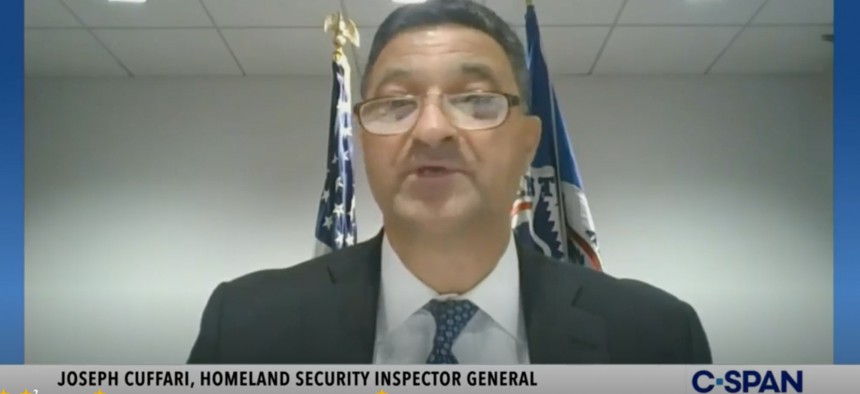
Joseph Cuffari was confirmed as inspector general for the Department of Homeland Security in July 2019. C-SPAN/Screengrab GovExec
DHS Watchdog Alleges Harassment, Chilling Effect and Constitutional Violations
A lawsuit filed this week alleges the Homeland Security inspector general and his office have been harassed by the Council of the Inspectors General on Integrity and Efficiency’s investigations, among other things.
The embattled Homeland Security watchdog and other officials filed a lawsuit on Tuesday against the federal watchdog council, taking aim at what they say are “vexatious” investigations into them and their structure.
The lawsuit, filed in the U.S. District Court for the Eastern District of Virginia, alleges that for three years Inspector General Joseph Cuffari “has been endlessly harassed and had his office’s resources drained by a series of baseless inquiries headed by the Council of the Inspectors General on Integrity and Efficiency’s Integrity Committee,” said the New Civil Liberties Alliance, a nonprofit civil rights group that seeks to reign in unlawful powers from federal and state agencies, which is representing the plaintiffs.
CIGIE, whose members are IGs, and its Integrity Committee, which reviews allegations made against IGs and top IG staff, were created and authorized by the 2008 Inspector General Reform Act. On Wednesday, CIGIE Executive Director Alan Boehm said the group was “aware of the complaint” and looked forward to working with the Justice Department on the matter.
A press release from the Alliance says that “the vexatious CIGIE/[Integrity Committee] investigations into the plaintiffs have had a chilling effect on their work and actions.” Additionally, the “plaintiffs have been forced to spend thousands in attorney fees to defend themselves against baseless charges surrounding their official actions. These investigations have also undermined or ignored the due process rights to which federal law entitles these individuals.”
According to the lawsuit, Cuffari––whose predecessor sped up his plans to retire after the office had to retract 13 flawed reports––was made aware of issues at the office shortly after he was confirmed in July 2019. “There was a level of withholding information, flouting rules, disrespect for proper authority, and risk of disgrace to the organization with which he was previously unfamiliar.” Cuffari made various protected disclosures to Congress and after the Integrity Committee decided not to take up an investigation, he engaged the law firm of Wilmer Hale, the lawsuit says.
“Eventually, Wilmer Hale prepared a report of its investigation, confirming many of IG Cuffari’s and others’ observations and fears,” the lawsuit continues. “In response to IG Cuffari’s attempts to reestablish order within DHS OIG, he was targeted by a relentless stream of meritless retaliatory complaints to the IC that continues to this day.” A footnote on this point adds that there have also been “relentless leaks and attacks in the press” due to those complaints.
“This campaign of distraction and harassment also impeded IG Cuffari’s ability to fulfill the assurances of decisive action that he gave to the members of the U.S. Senate who, during IG Cuffari’s confirmation process, had expressed deep concerns about the dysfunction within DHS OIG,” says the lawsuit. It also states that the Integrity Committee claimed its inquiries into Cuffari and requests for documents were for matters into his “personal capacity,” as opposed to official, therefore he couldn't use DHS IG resources and attorneys to respond to them.
Not mentioned in the lawsuit, but the Government Accountability Office issued a report in June 2021 that said “management and operational weaknesses from fiscal year 2015 through fiscal year 2020—many of which originated well before this time period and continue to persist—have affected DHS OIG’s ability to carry out its oversight mission effectively.” The IG office has said they are working to address GAO’s recommendations in part with the help of the National Academy of Public Administration.
The other plaintiffs are Kristen Fredericks, chief of staff to the IG and a member of the Senior Executive Service; James Reed, chief counsel to the IG and a member of the Senior Executive Service; and Joseph Gangloff, who retired in December 2019 after 43 years of government service, including at the Justice Department, Office of Government Ethics and Social Security Administration IG. There has been a “constant stream of allegations” against the plaintiffs, but none have been substantiated, said John Vechione, lead attorney on the case.
The plaintiffs asked the court to enjoin the Integrity Committee's actions against them and prohibit further actions against them without an order from the court. They also argue that the following are unconstitutional: Integrity Committee’s policies and procedures (they “impose substantive requirements upon individuals and employees beyond those required by federal statutes and contradict them” and did not undergo the notice and comment process), the committee's structure (membership violates the appointments clause of the U.S. Constitution) and the funding mechanism (which they say cedes too much power to the CIGIE executive chair).
Lastly, the plaintiffs seek a declaratory statement that Integrity Committee investigations into them cannot be considered “personal,” so they aren’t prevented from seeking their agency's counsel.
Over the last year, Cuffari has been under fire from lawmakers and the nonprofit Project on Government Oversight for issues related to sexual assault and domestic violence reports as well as the handling of investigations related to the Jan. 6, 2021 Capitol insurrection. Cuffari’s office has pushed back on all those issues.
POGO has also been calling on President Biden to fire Cuffari, and lawmakers have called for him to either be fired or step aside from these investigations. Last year POGO published a letter from an unknown number of anonymous employees at the DHS IG office imploring Biden to remove Cuffari, citing the workforce’s lack of trust.







